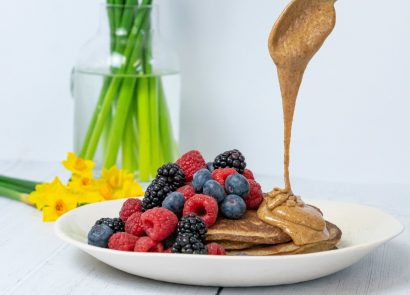From hormones to heart health, we’ve rounded up the best expert advice you and your family need to stay in top health this month
It’s frustrating to succumb to feelings of anxiousness on a regular basis, and anxiety sufferers can often feel a sense of hopelessness through doing so. Although diet changes shouldn’t replace thorough treatment and potential medication, it’s thought that certain foods could be used to calm down the physiological reactions to our natural in-built stress response.
Ditch the nigh time tipple
We know – giving up on alcohol can feel like neglecting one of your oldest companions. The familiar feeling of washing down a glass of fizz and an over-enthusiastic giggle with a group of friends can seem like an impossible habit to flush away. However, although it may feel like drinking works towards calming you down, because of its sedative properties, the effects it has on blood-sugar levels means that, once you’ve sobered up, your anxiety symptoms are likely to be off the chart. You just need to weigh up what’s more important – a few glasses of wine and some incoherent discussion over dinner on a Saturday night, or a calmer, more relaxed disposition on a Sunday morning. Which one is most likely to be an option you’d prefer?
Eat for your gut
“There’s been a lot of fascinating research around the gut-brain axis suggesting that the gut has the potential to be as complex and influential as our genes when it comes to our health and happiness,” explains Glenn Gibson, expert in food microbiology (bimuno.com). “We know that 90 percent of the happy hormone serotonin is produced in the gut. With this in mind, it’s essential for us to eat foods that are kind to our stomachs – prebiotic items such as leeks, onions, asparagus and Jerusalem artichokes are perfect for this. Prebiotics feed and stimulate the growth of good bacteria in the gut, which limits the space for bad bacteria. Probiotics and fermented foods can also assist the microbiome to ease signs of anxiety. Try adding sauerkraut, kefir, miso, kombucha and kimchi to your diet to test whether poor gut health could be hindering you on your path to overcoming your symptoms.”
Pack in the protein
The jury’s out on whether breakfast is, in fact, the most important meal of the day, but there’s nothing like the idea of food to help you peel yourself away from your duvet. “Try to start your morning with a source of protein instead of reaching for a high-sugar cereal,” says Dora Walsh, nutritionist at Care (allthecareyouneed.co.uk). “Certain proteins are high in the amino acid tryptophan, which is the precursor to feel-good neurotransmitter serotonin. Almonds, turkey, eggs, yoghurt and pumpkin seeds are great sources, so why not try scrambled eggs on toast, almond nut butter on toast, or yoghurt topped with pumpkin seeds and nuts to get your fix?”
Herbal help
The effects that various herbs can have on those bothersome nerves may surprise you. Many herbal teas market themselves as calming and soothing, but which ingredients should you search for in your online shop? Ditching the caffeine is a great place to start when deciding which brew is for you. “It’s like adding more fuel to the anxiety fire,” explains Laura Holland (lovebeu.com), nutritionist. “Caffeine is best avoided while your body finds its way to a more balanced state. Tulsi tea, however, also known as ‘holy basil’, is an amazing plant, it’s an adaptogen like ashwagandha that has been proven to regulate stress hormones and reduce anxiety.” We also recommend looking for ingredients such as chamomile, lemon balm and rhodiola when searching for the perfect calming cuppa.
Put the lid back on the biscuit tin
“There’s no denying that it’s easy to resort to sugary treats such as chocolate and sweets when you’re not feeling your most confident,” admits dietitian Juliette Kellow (almonds.co.uk). “Eating our feelings is something many of us Brits are guilty of and, when the going gets tough, the familiar crunch of a biscuit feels like a comforting embrace. We’re urging you to opt for a more nutrient-packed snack, such as a handful of almonds (about 28g) when feeling pangs of anxiety. Almonds are a high source of fibre and natural source of protein, both of which are associated with increased sensations of satiety that will tide you over until your next meal.” They’re also high in magnesium, which we’ll come to in a bit.
Make your munching mindful
“There’s a wonderful proverb that says ‘walk when walking, eat when eating’,” remarks Ali Mortimer, holistic life and happiness coach (heal-yourself-happy.com). “Along with a low-sugar, whole food, organic, mainly plantbased diet, you can apply mindful eating to help ease anxiety and mental health issues. Work through your senses while eating using a 5,4,3,2,1 technique; find five different tastes within your mouthful, find four different smells while eating, find three different sensations from the food (for example is it hot or smooth?), what two things can you see while you eat and what one thing can you hear when you bite into your meal? By using mindfulness, you become more aware of your surroundings and can ‘escape’ your possibly negative thoughts and focus on positivity and enjoyment. This can break a negative cycle and give your mind a rest, hopefully alleviating symptoms and feelings related to anxiety.”
Max the magnesium
Magnesium seems to be an all-round good egg in the vitamin and mineral world. Despite our ever-growing avocado obsession, however, it seems that many of us are decidedly deficient. As a natural muscle relaxer and all-round good guy, perhaps we should be paying more attention to magnesium when it comes to what we consume. “It can also assist with a better night’s sleep, which can contribute to lower anxiety levels,” explains nutritionist Rick Hay (rickhay.co.uk) This widespread inadequacy in terms of magnesium intake has been linked to anxiety disorders in various cases, and what makes things even more dismal is that stress makes our bodies worse at utilising the magnesium we consume – a vicious cycle indeed. We suggest filling up on foods like almonds (yes, again), avocados, pumpkin seeds, spinach and yoghurt, while also grabbing supplements when you can.
60-second meditations you can do anywhere
Colour breathing
“One of my favourite meditations is colour breathing,” says Dr Jo Gee, expert mindfulness psychotherapist and co-founder of The Luna Hive (thelunahive.com). “For 60 seconds, you imagine slowly breathing in one colour, and then imagine slowly breathing out another. This not only helps to still your mind and give you some headspace, but also releases feel-good neurotransmitters and hormones.”
Morning ritual
“After you wake up, sit up straight on the edge of your bed with your feet flat on the floor,” says mindfulness coach Justine Curlis (surreymindfulness.co.uk). “Take a moment to examine your thoughts without judging them or getting into a conversation with them, and notice how you’re feeling. Finish by bringing your attention to feeling the rise and fall of your next 10 breaths, before getting on with your day.”
The ‘let go’ breath
“A quick, simple and effective 60-second meditation is the ‘let go’ breath,” explains wellbeing therapist Atifa Balding. “All you need to do is take slow and deep breaths in and out. With each inhale, mentally say ‘let’, and with every exhale, say ‘go’. Imagine that you’re softening your entire body and let yourself relax.”






















